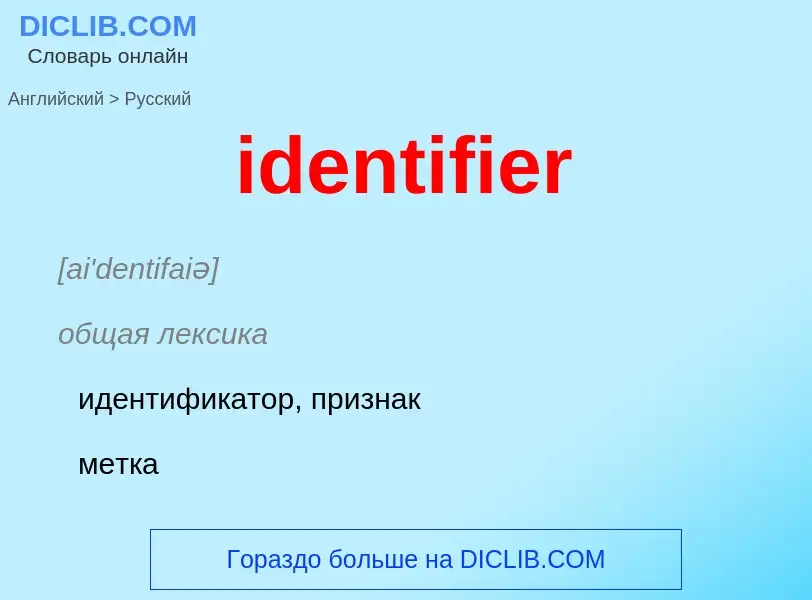Traducción y análisis de palabras por inteligencia artificial ChatGPT
En esta página puede obtener un análisis detallado de una palabra o frase, producido utilizando la mejor tecnología de inteligencia artificial hasta la fecha:
- cómo se usa la palabra
- frecuencia de uso
- se utiliza con más frecuencia en el habla oral o escrita
- opciones de traducción
- ejemplos de uso (varias frases con traducción)
- etimología
identifier - traducción al ruso
[ai'dentifaiə]
общая лексика
идентификатор, признак
метка
имена, присваиваемые переменным, константам, структурам данных, классам, процедурам, функциям, методам и другим программным объектам. Некоторые языки программирования требуют объявления идентификаторов до их использования в программе (explicit declaration)
логическое имя устройства
идентификатор
опознаватель
отождествитель
синоним
существительное
программирование
идентификатор
признак
- biometric identifier
- challenge-response personal identifier
- data identifier
- entity identifier
- eyeball identifier
- general identifier
- hand geometry identifier
- handheld identifier
- intrinsic identifier
- invalid user identifier
- key identifier
- logical identifier
- login identifier
- message identifier
- network user identifier
- one-time identifier
- personal identifier
- physical identifier
- picture identifier
- private identifier
- protocol identifier
- suspended user identifier
- unforgeable identifier
- unique identifier
- universal identifier
- unknown identifier
- user identifier
- watchdog identifier
Definición
Wikipedia

An identifier is a name that identifies (that is, labels the identity of) either a unique object or a unique class of objects, where the "object" or class may be an idea, physical countable object (or class thereof), or physical noncountable substance (or class thereof). The abbreviation Id often refers to identity, identification (the process of identifying), or an identifier (that is, an instance of identification). An identifier may be a word, number, letter, symbol, or any combination of those.
The words, numbers, letters, or symbols may follow an encoding system (wherein letters, digits, words, or symbols stand for [represent] ideas or longer names) or they may simply be arbitrary. When an identifier follows an encoding system, it is often referred to as a code or id code. For instance the ISO/IEC 11179 metadata registry standard defines a code as system of valid symbols that substitute for longer values in contrast to identifiers without symbolic meaning. Identifiers that do not follow any encoding scheme are often said to be arbitrary Ids; they are arbitrarily assigned and have no greater meaning. (Sometimes identifiers are called "codes" even when they are actually arbitrary, whether because the speaker believes that they have deeper meaning or simply because they are speaking casually and imprecisely.)
The unique identifier (UID) is an identifier that refers to only one instance—only one particular object in the universe. A part number is an identifier, but it is not a unique identifier—for that, a serial number is needed, to identify each instance of the part design. Thus the identifier "Model T" identifies the class (model) of automobiles that Ford's Model T comprises; whereas the unique identifier "Model T Serial Number 159,862" identifies one specific member of that class—that is, one particular Model T car, owned by one specific person.
The concepts of name and identifier are denotatively equal, and the terms are thus denotatively synonymous; but they are not always connotatively synonymous, because code names and Id numbers are often connotatively distinguished from names in the sense of traditional natural language naming. For example, both "Jamie Zawinski" and "Netscape employee number 20" are identifiers for the same specific human being; but normal English-language connotation may consider "Jamie Zawinski" a "name" and not an "identifier", whereas it considers "Netscape employee number 20" an "identifier" but not a "name." This is an emic indistinction rather than an etic one.

![motor vehicles]]. motor vehicles]].](https://commons.wikimedia.org/wiki/Special:FilePath/4373 Russian license plate Toyota car.jpg?width=200)
